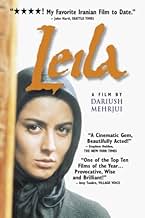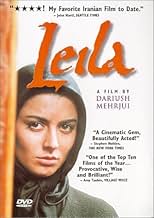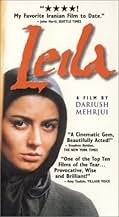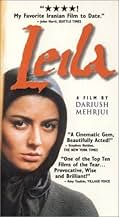IMDb रेटिंग
7.4/10
4.3 हज़ार
आपकी रेटिंग
अपनी भाषा में प्लॉट जोड़ेंThe story of a semi-modern Iranian couple, who are trying to fight the old beliefs and old generation, but is a failing battle because the man is not strong enough.The story of a semi-modern Iranian couple, who are trying to fight the old beliefs and old generation, but is a failing battle because the man is not strong enough.The story of a semi-modern Iranian couple, who are trying to fight the old beliefs and old generation, but is a failing battle because the man is not strong enough.
- निर्देशक
- लेखक
- स्टार
- पुरस्कार
- कुल 8 जीत
फ़ीचर्ड समीक्षाएं
this film is indicating a semi modern Iranian couple ,who are trying to fight with old believes &old generation.in this battle they fail cause the man is not strong enough.if you really want to understand this film you must know a lot about Iranian nowadays culture. Leila is the symbol of a young Iranian woman who marry with love but others interferer her life with the name of family traditions and customs.specially her husbands family .at the end of film it shows that every one is damaged by this interference Leila,her husband,mother in law&... the subject is some how strange for westerners,but many of your subjects are strange for easterners too!
Filmmaker Dariush Mehrjui has given us a stylish, thoughtful and moving Iranian film, "Leila" 1998. Anyone can easily appreciate the storyline, and most of all, women can empathize with central heroine Leila, the emotional journey that she is going through. Actress Leila Hatami captured the role of Leila, the young capable wife, to perfect tempo. Actor Ali Mosaffa comparably portrayed her loving supportive husband Reza. Together they put us at ease even when we see them arguing or frustrated by his mother's interfering calls - we somehow felt they would pull through. Or would they? Can Leila withstand her mother in law's insistence? Her silence to her own parents about her 'secret' lend no backbone solace to herself. How will she manage?
Mehrjui also wrote the screenplay and his direction of the film is just as poignant. Its eloquence is at once unflinching and beautiful, devastating and thoughtful. In a culture so traditional, full of 'compulsory' expectations of an heir, a grandson, Leila and Reza is really depicted as quite modern in their marriage and thinking. There is suspense, alright, as we wait and waver with Leila, as we want to side with Reza to let things be. Yet once Leila decided to go ahead, the mood and pace transformed to anticipation and wonderment. We want to respect their reactions. We hope things would work out in Leila (and Reza)'s favor. Will they? How will it all end? The devastation Leila experienced touches us deeply. We worry for her. What shall Reza do? So many questions. So many unknowns. Hang in there. Writer-director-producer Mehrjui does not disappoint. "Leila" is a wonderful 'filmic' journey in spite of having to read subtitles. The acting, cinematography, score, everything about it is quality production. (129 minutes in Farsi with English subtitles.)
Mehrjui also wrote the screenplay and his direction of the film is just as poignant. Its eloquence is at once unflinching and beautiful, devastating and thoughtful. In a culture so traditional, full of 'compulsory' expectations of an heir, a grandson, Leila and Reza is really depicted as quite modern in their marriage and thinking. There is suspense, alright, as we wait and waver with Leila, as we want to side with Reza to let things be. Yet once Leila decided to go ahead, the mood and pace transformed to anticipation and wonderment. We want to respect their reactions. We hope things would work out in Leila (and Reza)'s favor. Will they? How will it all end? The devastation Leila experienced touches us deeply. We worry for her. What shall Reza do? So many questions. So many unknowns. Hang in there. Writer-director-producer Mehrjui does not disappoint. "Leila" is a wonderful 'filmic' journey in spite of having to read subtitles. The acting, cinematography, score, everything about it is quality production. (129 minutes in Farsi with English subtitles.)
Most Iranian movies I've seen so far seem to deal with simple emotions among poor people (e.g. boy looking for friend's house in the next village to return notebook). Leila's characters, freed from the struggle for survival, display a full range of human emotions and complexities. Brilliantly acted, scripted, edited.
Dariush Mehrjui is one of Iran's finest modern filmmakers, his specialty is making films about relationships among the upper-middle-class illuminati and especially love stories about women. This drama is a very powerful, poignant and mesmerizing love story, about the pressures of dealing with Moslem traditions and of a woman's own sense of being.
A very warm couple, the handsome Reza (Ali Mosaffa) and the beautiful Leila (Leila Hatami), perfectly suited for each other in temperament find happiness in their first year of marriage. Why this marriage should turn ice cold, when everything is so blissful is amazing to watch as it unfolds. This is a truly heartbreaking tale without contrivances that examines a woman's psyche, looking carefully at her wants and her expectations. The trouble starts when after a year, there is no child. The couple visits a doctor and are tested to see if either one has infertility problems. They swear their love for each other and in their own quiet way say that it doesn't matter who is to blame, they will stay married no matter what. The problem comes from Leila's overbearing mother-in-law (Jamileh Sheikhi), a monster if there ever was one. She rattles the poor, sensitive girl and completely intimidates her, stressing how important it is to have a son to carry out the family name. The wealthy Reza, who works in his father's company, is the only son, there are four daughters. When the news from the lab comes back that Leila is barren, that her hormonal levels are too low to ever have children, the mother-in-law heartlessly puts the burden on her -- telling her that she is holding her son back from raising a family.
The weak son never confronts his mother as he seems perplexed, even as his wife begins to slowly sink into a shell, confused and ashamed about herself, unwilling to confide in anyone, not even her mother. She receives passive support from Reza but she can't face the treacherous mother-in-law when alone, who has the gift of twisting things around during her visits while pretending to be nice by bearing gifts and then she turns on her nasty tongue; this makes Leila feel inadequate as she just tries to please her by agreeing with whatever she says. The mother is so invasive of the couple's privacy that she calls them always at the wrong moment and the ringing phone is like a knife sticking Leila in her vulnerable spots. It is so painful to just watch the phone and hear it ringing, and watch Leila cringe at the thought of hearing what her mother-in-law has to say.
The selfish mother-in-law after two years of intimidating the girl by telling her Reza wants a child so much he will sneak behind her back and have a child with another woman, and then to have the nerve to suggest that Leila give her permission for Reza to get another wife. Evidently, polygamy is permitted in Iran.
Reza reacts by saying he doesn't want another wife and that he can live happily without children, just as long as she returns to being the old playful Leila who smiles so easily and is close to him. But he never reassures her that he means what he says and she grows more distant from him talking to herself out loud, so that we could hear her express things that she feels she can't tell anyone else. She can't take the pressure anymore, so she pushes Reza to look for a new wife. On each occasion, when Reza goes courting, he requests that she ride with him to meet his perspective bride as he drops her off by the stores to shop while he goes to look over the woman his Aunt Shamsi or his mother-in-law chose for him.
Reza is never forceful enough in his statements telling her that it doesn't matter that she can't have children, as Leila has nagging doubts about whether he really means it or is just saying it. The couple have all the creature comforts of modern life and are seen playfully watching Dr. Zhivago on TV together, but tradition is also very strong. She stays home and does the cooking and the womanly chores while wearing as she must, by Iranian law, a chador to cover her head. There seems to be no problem following these traditions, but this modern couple has its feet stuck in two different worlds and they seem confused as to where they really want to be standing.
I recently saw another film from the Middle-East, "Kadosh," an Israeli film with the same topic and the same intransigent attitude was displayed by those who call themselves ultra-orthodox believers in God, who believe a woman who is barren has been cursed by God.
This is a very compelling and subtle film, it shows the current conflict in Iran between modernity and Islamic tradition. It is also about the universal problem of love as seen through the psyche of a woman who is stripped of her self-esteem and even though she is beautiful and has a considerate husband, she is still not sure of what her role is in society.
A very warm couple, the handsome Reza (Ali Mosaffa) and the beautiful Leila (Leila Hatami), perfectly suited for each other in temperament find happiness in their first year of marriage. Why this marriage should turn ice cold, when everything is so blissful is amazing to watch as it unfolds. This is a truly heartbreaking tale without contrivances that examines a woman's psyche, looking carefully at her wants and her expectations. The trouble starts when after a year, there is no child. The couple visits a doctor and are tested to see if either one has infertility problems. They swear their love for each other and in their own quiet way say that it doesn't matter who is to blame, they will stay married no matter what. The problem comes from Leila's overbearing mother-in-law (Jamileh Sheikhi), a monster if there ever was one. She rattles the poor, sensitive girl and completely intimidates her, stressing how important it is to have a son to carry out the family name. The wealthy Reza, who works in his father's company, is the only son, there are four daughters. When the news from the lab comes back that Leila is barren, that her hormonal levels are too low to ever have children, the mother-in-law heartlessly puts the burden on her -- telling her that she is holding her son back from raising a family.
The weak son never confronts his mother as he seems perplexed, even as his wife begins to slowly sink into a shell, confused and ashamed about herself, unwilling to confide in anyone, not even her mother. She receives passive support from Reza but she can't face the treacherous mother-in-law when alone, who has the gift of twisting things around during her visits while pretending to be nice by bearing gifts and then she turns on her nasty tongue; this makes Leila feel inadequate as she just tries to please her by agreeing with whatever she says. The mother is so invasive of the couple's privacy that she calls them always at the wrong moment and the ringing phone is like a knife sticking Leila in her vulnerable spots. It is so painful to just watch the phone and hear it ringing, and watch Leila cringe at the thought of hearing what her mother-in-law has to say.
The selfish mother-in-law after two years of intimidating the girl by telling her Reza wants a child so much he will sneak behind her back and have a child with another woman, and then to have the nerve to suggest that Leila give her permission for Reza to get another wife. Evidently, polygamy is permitted in Iran.
Reza reacts by saying he doesn't want another wife and that he can live happily without children, just as long as she returns to being the old playful Leila who smiles so easily and is close to him. But he never reassures her that he means what he says and she grows more distant from him talking to herself out loud, so that we could hear her express things that she feels she can't tell anyone else. She can't take the pressure anymore, so she pushes Reza to look for a new wife. On each occasion, when Reza goes courting, he requests that she ride with him to meet his perspective bride as he drops her off by the stores to shop while he goes to look over the woman his Aunt Shamsi or his mother-in-law chose for him.
Reza is never forceful enough in his statements telling her that it doesn't matter that she can't have children, as Leila has nagging doubts about whether he really means it or is just saying it. The couple have all the creature comforts of modern life and are seen playfully watching Dr. Zhivago on TV together, but tradition is also very strong. She stays home and does the cooking and the womanly chores while wearing as she must, by Iranian law, a chador to cover her head. There seems to be no problem following these traditions, but this modern couple has its feet stuck in two different worlds and they seem confused as to where they really want to be standing.
I recently saw another film from the Middle-East, "Kadosh," an Israeli film with the same topic and the same intransigent attitude was displayed by those who call themselves ultra-orthodox believers in God, who believe a woman who is barren has been cursed by God.
This is a very compelling and subtle film, it shows the current conflict in Iran between modernity and Islamic tradition. It is also about the universal problem of love as seen through the psyche of a woman who is stripped of her self-esteem and even though she is beautiful and has a considerate husband, she is still not sure of what her role is in society.
The characters and the circumstances in this movie are so well developed that it is hard not to feel just as angry, devastated and numb as Leila. You feel like you become part of a real family that has real dysfunction and is trying to get along despite it all. The few things I did not like include the subtitles, as they were at times difficult to read at the speed they were moving, as well as some of the lighting. There are a few scenes where it would has been nice to see more of the characters' features. Regardless, I feel so much more satisfied after watching this movie that any other run of the mill romantic comedy at the movie theatre. If you are a movie lover and are looking for something different, go watch this movie.
क्या आपको पता है
- भाव
Leila: God has not given me a child. Instead He has given me the gift of eternal patience and endurance.
- कनेक्शनFeatured in Shabhaye roshan (2003)
टॉप पसंद
रेटिंग देने के लिए साइन-इन करें और वैयक्तिकृत सुझावों के लिए वॉचलिस्ट करें
- How long is Leila?Alexa द्वारा संचालित
विवरण
बॉक्स ऑफ़िस
- US और कनाडा में सकल
- $5,294
- US और कनाडा में पहले सप्ताह में कुल कमाई
- $5,294
- 16 मई 1999
- दुनिया भर में सकल
- $8,231
इस पेज में योगदान दें
किसी बदलाव का सुझाव दें या अनुपलब्ध कॉन्टेंट जोड़ें













